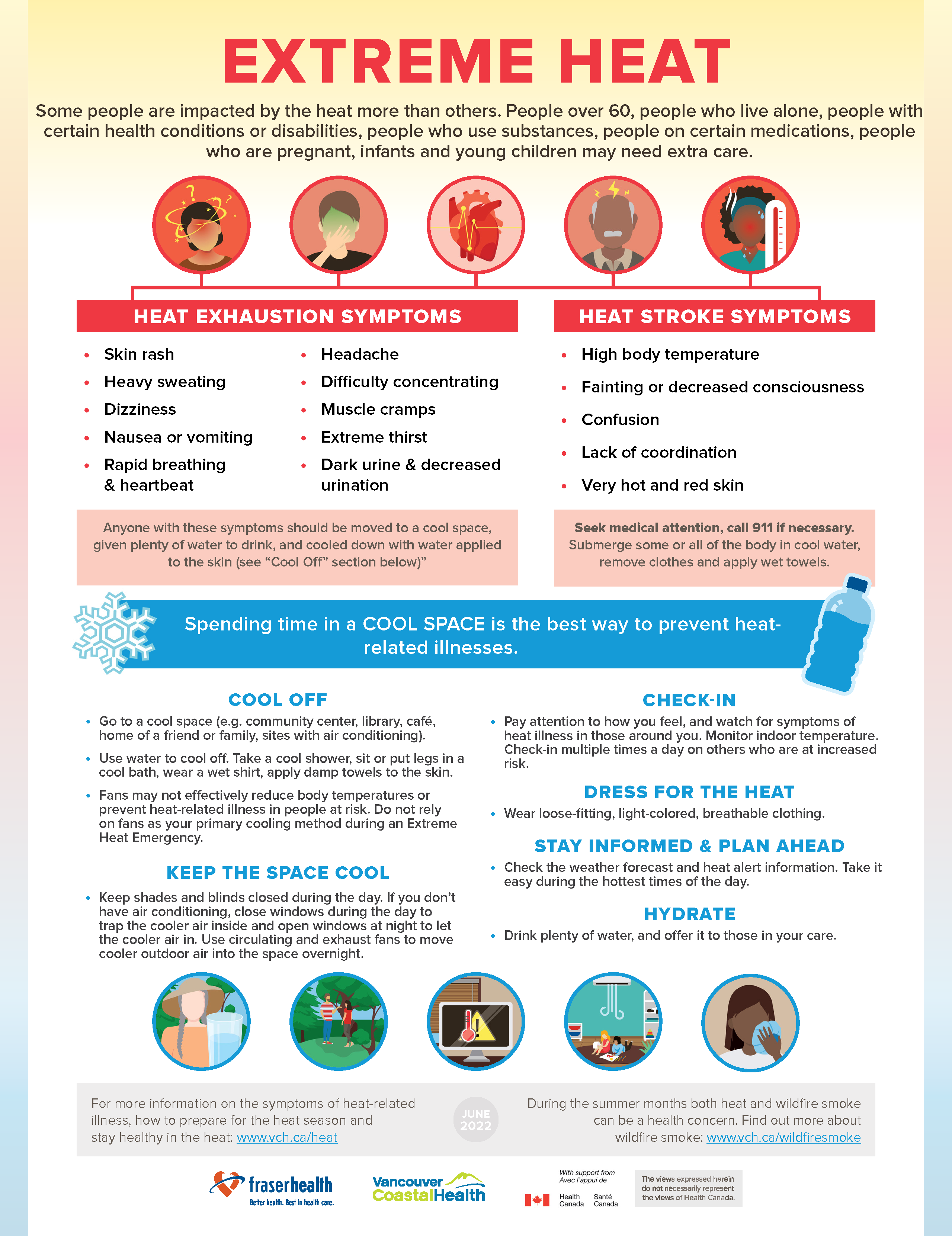Beat the Heat
Here comes the heat. In collaboration and cooperation with Vancouver Coastal Health, we are asking you to prepare and stay cool.

Extreme heat events are announced by Environment and Climate Change Canada and provincial/territorial health authorities at temperatures that are associated with increased deaths and hospitalizations.
Environment Canada issues a heat warning when two or more consecutive days of daytime maximum temperatures are expected to reach 29°C or warmer and nighttime minimum temperatures are expected to fall to 16°C or warmer.
Key points to remember during a heat wave
Watch for heavy sweating, rash, cramps, fainting, high body temperature, and worsening health conditions.
Never leave children or pets unattended in parked vehicles. Leaving the car windows slightly open will not keep the inside of the vehicle at a safe temperature.
Seek cool spaces like shaded areas or air-conditioned buildings when overheated. The Powell River Public Library is a good place to go to stay cool with air conditioning, water refill stations and a space to relax.
Remember to stay hydrated and to check in on others.
Who Is at Risk
Extreme heat can be dangerous for everyone, but some groups are at a higher risk of heat-related illness. Here's a list of people who need to be extra careful during hot weather:
Low-income renters: They may not be able to afford air conditioning or have limited access to cool spaces.
Older adults living alone or in isolation: They may be unable to care for themselves or check in with others during a heat wave.
People living with a disability: Certain disabilities may make it difficult to stay cool or get help in an emergency.
People with a chronic medical condition: Heat can worsen pre-existing conditions like heart disease, respiratory problems, and mental illness.
People living alone: Without someone to check in, they may not receive help if they start suffering from heat exhaustion.
People who use substances: Substance use can interfere with the body's ability to regulate temperature.
People experiencing homelessness or living in precarious housing, lack of shelter. limited access to resources underlying health conditions and social isolation. People experiencing homelessness are 200-300 times more likely to die from heat-related illnesses compared to the general population.
Please check on your friends, family, and neighbours who may be at risk.
Watch for the symptoms of Heat Exhaustion
It's important to know the signs and symptoms of heat exhaustion and heat stroke so you can act quickly. Please check out the poster above to learn more.
If you experience any of these symptoms during extreme heat, move to a cool place at once and drink water.
Heat stroke is a medical emergency! Call 911 or your local emergency number immediately. While waiting for help, quickly do the following:
Cool the person right away by:
Apply cold water to large areas of the skin
Fan the person as much as possible
Heat Pumps
Heat pumps keep your home comfortable by providing cooling in the summer and keeping your home warm in the cold months while significantly reducing your energy costs and carbon footprint. Are you interested in installing a heat pump in your home? Learn more about Heat Pumps and the available rebates here.
Cooling Landscaping
As our climate continues to get warmer, have you thought about how you could implement cooling measures at home through landscaping? Cooling landscaping has many benefits for helping both air-conditioned and non-air-conditioned homes ride out an extreme heat event while looking good!
Figure 1

Figure 1: Building America Solution Center: https://basc.pnnl.gov/resource-guides/landscaping-reduce-cooling-load#edit-group-scope
We’ve put together a non-exhaustive list of resources and ideas to help you to find ways to improve your extreme heat management at home whether you’re building a new home or interested in making changes to your current home. Please see the links below:
Quick Links:
Here are some tips for keeping your home cooler and how to access applicable rebates:
More households saving money with expanded heat-pump program | BC Gov News
Check your eligibility for the Oil to Heat Pump Affordability program (canada.ca)
Environment and Natural Resources Canada: Weather Information for qathet region
Environment and Natural Resources Canada: Weather Information and Interactive Map
Government of Canada: Staying Healthy in the Heat Infographic
